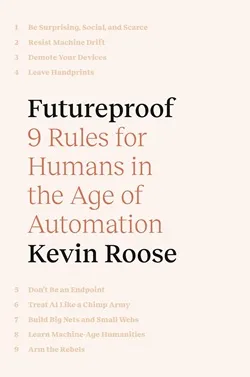
I picked this book up thinking that it’d be a self-help, career book. I’ve been reading a lot of those these days. But, I was pleased to find that it was something else entirely. Kevin Roose’s Futureproof is a smart book that critically analyzes both techno-utopianism and techno-nihilism and he finds that neither is quite so suitable to the current moment. Roose instead describes himself as a “suboptimist,” and this was a welcome departure from so many other books that I’ve read lately.
He begins the book with an examination of some of the claims made by techno-utopians, most of which boil down to something along the lines of: “Oh, people have always poo-poo’d technology. Those are just luddites; and they were wrong! Look at everything it gave us.” I, like Roose, have never been convinced by these views. Sure, we have gained an industrial civilization, and I certainly would not want to wind up eating as European forefathers did: tasteless porridge and onions while at risk of dying from some preventable disease and while exerting myself each day due to backbreaking labor. But, the answer is also not technology as a sheer solution. So often, the dislocations are enormous, and there’s no guarantee that whatever comes next will create gainful employment for those displaced in the next wave (especially when many predictions point at up to 70% of all jobs being at risk of automation in the next decade).
To confront this, Roose offers a series of rules–and, more interestingly–anecdotes to help us in the coming age. The language used to describe the rules are not obvious at first, but they do click. For instance, “Rule #2: Resist Machine Drift.” Well, what does this mean? It means that we need to stop acting like John Henry. We will not be able to hustle ourselves into new jobs when any AI is capable of outhustling us. At the same time, we must actively fight against the algorithmic flattening of culture and maintain our own identity.
What “Rule #4: Leave Handprints?” The most compelling case here is of one Toyota worker in the mid-20th century who developed an art of identifying weaknesses in machinic production, coming to pinpoint when machines will work (and when they won’t). This is important; while we corporate executives are in the midst of automating the entire means of production, there will be serious failing in terms of quality control, and humans seem to be better at identifying human needs on this front.
Finally, there’s the rule that I found most interesting: “Rule #5: Don’t Be an Endpoint.” Roose correctly points out that so many positions now are based on being in between two technological systems (i.e. APIs) that do not (or cannot) communicate with one another. So, for example, a physicians’ assistant who examines readings and puts them in another computer system, in this case, is an endpoint. I had never thought about it this way before, and I’m really glad that Roose brought it to my attention.
While there are self-help-y elements of the book (after all, it is subtitled “9 Rules for Humans”), the book is more than anything a distillation of good technological journalism while bring us actionable points to improve our own lives as we weather this storm. It was illumating and I–who thought this book would be surface level–learned so much from it.
Very highly recommend!